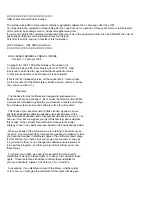
IPv4 Unicast Routing
ExtremeWare XOS 11.3 Concepts Guide
512
For example, if the following policy file is used as a UDP forwarding profile, any packets destined for
UDP port 67 will be sent to IP address 20.0.0.5 AND flooded to VLAN
to7
:
entry one {
if match all {
destination-port 67 ;
} then {
destination-ipaddress 20.0.0.5 ;
}
}
entry two {
if match all {
destination-port 67 ;
} then {
vlan "to7" ;
}
}
If you include more than one VLAN set attribute or more than one destination-ipaddress set attribute in
one policy entry, the last one will be accepted and the rest ignored. Therefore, you can have two valid
set statements in each entry of a UDP forwarding policy; one a destination-ipaddress and one a VLAN.
ExtremeWare XOS currently allows a maximum of eight entries in a UDP forwarding policy, so you can
define a maximum of sixteen destinations for one inbound broadcast UDP packet: eight IP address and
eight VLANs.
NOTE
It is strongly advised not to have more than eight entries in a UDP forwarding profile. The UDP forwarding module
will process those entries even if the entries do not contain any attributes for UDP forwarding. Having more than
eight entries will drastically reduce the performance of the system. If the inbound UDP traffic rate is very high,
having more than eight entries could cause the system to freeze or become locked.
NOTE
If you rename a VLAN referred to in your UDP forwarding profile, you must manually edit the policy to reflect the
new name, and refresh the policy.
You can also validate whether the UDP profile has been successfully associated with the VLAN by
using the command
show policy {<policy-name> | detail}
. UDP forwarding is implemented as
part of the netTools process, so the command will display netTools as a user of the policy.
To remove a policy, use the none form of the following command:
configure vlan <vlan_name> udp-profile [<profilename> | none]
or use this command:
unconfigure vlan <vlan_name> udp-profile
For more information about creating and editing policy files, see
Chapter 12
,
“Policy Manager”
. For
more information about ACL policy files, see
Chapter 13
,
“Access Lists (ACLs)”
.
Summary of Contents for ExtremeWare XOS 11.3
Page 20: ...Contents ExtremeWare XOS 11 3 Concepts Guide 20...
Page 25: ...1 Using ExtremeWare XOS...
Page 26: ......
Page 38: ...ExtremeWare XOS Overview ExtremeWare XOS 11 3 Concepts Guide 38...
Page 58: ...Accessing the Switch ExtremeWare XOS 11 3 Concepts Guide 58...
Page 146: ...Configuring Slots and Ports on a Switch ExtremeWare XOS 11 3 Concepts Guide 146...
Page 218: ...Status Monitoring and Statistics ExtremeWare XOS 11 3 Concepts Guide 218...
Page 240: ...Virtual LANs ExtremeWare XOS 11 3 Concepts Guide 240...
Page 248: ...Virtual Routers ExtremeWare XOS 11 3 Concepts Guide 248...
Page 278: ...Access Lists ACLs ExtremeWare XOS 11 3 Concepts Guide 278...
Page 288: ...Routing Policies ExtremeWare XOS 11 3 Concepts Guide 288 entry deny_rest if then deny...
Page 344: ...Security ExtremeWare XOS 11 3 Concepts Guide 344...
Page 393: ...2 Using Switching and Routing Protocols...
Page 394: ......
Page 454: ...Spanning Tree Protocol ExtremeWare XOS 11 3 Concepts Guide 454...
Page 484: ...Extreme Standby Router Protocol ExtremeWare XOS 11 3 Concepts Guide 484...
Page 514: ...IPv4 Unicast Routing ExtremeWare XOS 11 3 Concepts Guide 514...
Page 530: ...IPv6 Unicast Routing ExtremeWare XOS 11 3 Concepts Guide 530...
Page 538: ...RIP ExtremeWare XOS 11 3 Concepts Guide 538...
Page 556: ...OSPF ExtremeWare XOS 11 3 Concepts Guide 556...
Page 566: ...OSPFv3 ExtremeWare XOS 11 3 Concepts Guide 566...
Page 589: ...3 Appendixes...
Page 590: ......
Page 640: ...CNA Agent ExtremeWare XOS 11 3 Concepts Guide 640...
Page 670: ...Glossary ExtremeWare XOS 11 3 Concepts Guide 670...
Page 698: ...Index ExtremeWare XOS 11 3 Concepts Guide 698...
















































